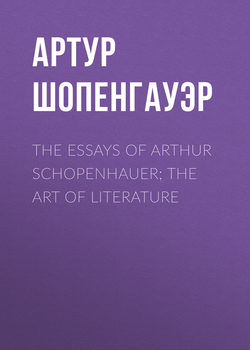The Essays of Arthur Schopenhauer; The Art of Literature

Реклама. ООО «ЛитРес», ИНН: 7719571260.
Оглавление
Артур Шопенгауэр. The Essays of Arthur Schopenhauer; The Art of Literature
ON AUTHORSHIP
ON STYLE
ON THE STUDY OF LATIN
ON MEN OF LEARNING
ON THINKING FOR ONESELF
ON CRITICISM
ON REPUTATION
ON GENIUS
Отрывок из книги
There are, first of all, two kinds of authors: those who write for the subject's sake, and those who write for writing's sake. While the one have had thoughts or experiences which seem to them worth communicating, the others want money; and so they write, for money. Their thinking is part of the business of writing. They may be recognized by the way in which they spin out their thoughts to the greatest possible length; then, too, by the very nature of their thoughts, which are only half-true, perverse, forced, vacillating; again, by the aversion they generally show to saying anything straight out, so that they may seem other than they are. Hence their writing is deficient in clearness and definiteness, and it is not long before they betray that their only object in writing at all is to cover paper. This sometimes happens with the best authors; now and then, for example, with Lessing in his Dramaturgie, and even in many of Jean Paul's romances. As soon as the reader perceives this, let him throw the book away; for time is precious. The truth is that when an author begins to write for the sake of covering paper, he is cheating the reader; because he writes under the pretext that he has something to say.
Writing for money and reservation of copyright are, at bottom, the ruin of literature. No one writes anything that is worth writing, unless he writes entirely for the sake of his subject. What an inestimable boon it would be, if in every branch of literature there were only a few books, but those excellent! This can never happen, as long as money is to be made by writing. It seems as though the money lay under a curse; for every author degenerates as soon as he begins to put pen to paper in any way for the sake of gain. The best works of the greatest men all come from the time when they had to write for nothing or for very little. And here, too, that Spanish proverb holds good, which declares that honor and money are not to be found in the same purse —honora y provecho no caben en un saco. The reason why Literature is in such a bad plight nowadays is simply and solely that people write books to make money. A man who is in want sits down and writes a book, and the public is stupid enough to buy it. The secondary effect of this is the ruin of language.
.....
What the address is to a letter, the title should be to a book; in other words, its main object should be to bring the book to those amongst the public who will take an interest in its contents. It should, therefore, be expressive; and since by its very nature it must be short, it should be concise, laconic, pregnant, and if possible give the contents in one word. A prolix title is bad; and so is one that says nothing, or is obscure and ambiguous, or even, it may be, false and misleading; this last may possibly involve the book in the same fate as overtakes a wrongly addressed letter. The worst titles of all are those which have been stolen, those, I mean, which have already been borne by other books; for they are in the first place a plagiarism, and secondly the most convincing proof of a total lack of originality in the author. A man who has not enough originality to invent a new title for his book, will be still less able to give it new contents. Akin to these stolen titles are those which have been imitated, that is to say, stolen to the extent of one half; for instance, long after I had produced my treatise On Will in Nature, Oersted wrote a book entitled On Mind in Nature.
A book can never be anything more than the impress of its author's thoughts; and the value of these will lie either in the matter about which he has thought, or in the form which his thoughts take, in other words, what it is that he has thought about it.
.....